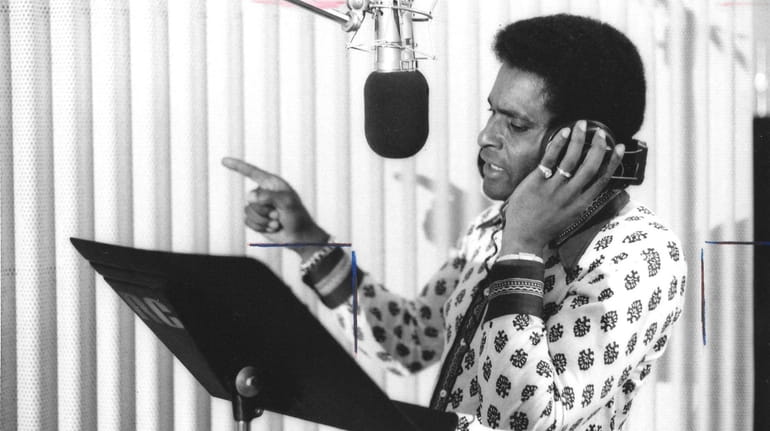'Charley Pride: I'm Just Me' review: stunning story of groundbreaking country-music star

Groundbreaking country music star Charley Pride recording in the studio. Credit: PBS
DOCUMENTARY “Charley Pride: I’m Just Me” on “American Masters”
WHEN | WHERE Friday at 9 p.m. on WNET/13
WHAT IT’S ABOUT This "American Masters" documentary tells the story of how Charley Pride went from a sharecropper’s son in Sledge, Mississippi, to a Negro American League baseball player and then a country music superstar with hits like “Kiss an Angel Good Mornin’” and “All I Have to Offer You (Is Me)” told through his collaborators and admirers, including Garth Brooks, Dolly Parton and Willie Nelson, as well as Pride himself and his wife of 61 years, Rozene.
MY SAY Charley Pride became a country superstar because of his amazing voice and his authentic love for the music of Jimmie Rodgers and the other Grand Ole Opry stars that he listened to with his father. Being African American did not help him succeed, though many still insist on limiting what he achieved by bringing race into it, as if he would never have made it if he were white.
Parton, who collaborated with Pride, makes it clear, saying he succeeded because “he sang so much better than so many of the good country artists . . . at the time — them good ol’ white boys. Charley just gave ‘em a run for their money.”
Whoopi Goldberg makes it even clearer: “He is one of America’s great country stars. He is Americana personified. He is exactly what an ‘American Master’ should be.”
In “Charley Pride: I’m Just Me,” director Barbara Hall skillfully balances the topic of Pride’s race with his clear musical talent. Early on, Pride tells a story about a famous singer calling him a racial epithet that makes his friend Lloyd Green, also on camera, visibly cringe. “That’s what he said,” Pride says, moving on with the story. Later he admits people don’t believe him when he says he never got a race-based catcall onstage.
Singer-songwriter Charlie Worsham explains it as “an incredible ability to let things go and shrug things off his shoulders that would cripple or choke another person.” Singer-songwriter Darius Rucker said it was part of Pride’s strength. “I can’t imagine what it was like,” he said. “As tough as it was, it made him see the world in a very unique and beautiful way.”
Pride, 80, is clearly more comfortable talking about his music, which is as it should be. His easygoing style and deep, gorgeous voice enhanced whatever he sang, using the musical styles he loved to build a delivery all his own.
“American music is made up of gospel, country and the blues — those three,” he says, explaining his influences. “I think each one borrowed from the other.”
And Pride believes that is what unites all fans of American music — regardless of their race.
BOTTOM LINE A stunning tale of how sometimes talent and tirelessness can triumph
